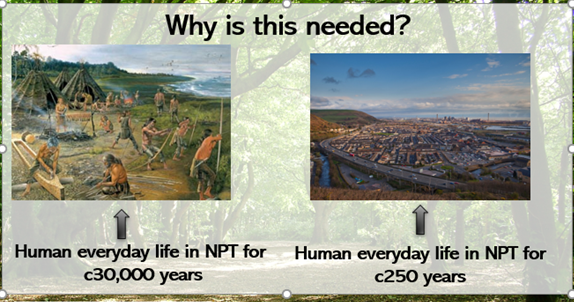Hello from one of the partners on this amazing project - Coed Lleol (Small Woods).
Coed Lleol is the name for the Small Woods Association in Wales. We help to improve the health and wellbeing of people across Wales through woodland and nature-based activities.
In these darker winter months many people struggle with low moods, lack of energy and increased stress levels (especially towards the end of the month…) so we wanted to share a few simple tips with you about using nature to boost your mood - and a little bit of the science behind this.
Firstly- why are nature connection services needed?
Humans evolved in a very different environment to what we experience day-to-day in modern times. Unfortunately, evolution can’t keep pace with the changes in our lifestyle! We are still biologically programmed to live in a very different environment. For example, anxiety and adrenaline: our fight or flight response evolved to give us increased physical performance in times of danger. However in modern times that response is often triggered in environments where we cannot make use of this adrenaline surge (for example, getting stressed out when working in an office needs a different response to running away from a sabre-tooth tiger!) so the adrenaline is not broken down and we experience negative physical symptoms. This happens with lots of other processes our body goes through, especially when relating to stress, fatigue and famine.

Artist: - Photo reuse details
Exposure to nature has been demonstrated to improve health in a huge variety of ways, including;
When we spend time in nature, our bodies reward us in lots of different ways. Here is just a glimpse of some of the scientific papers that evidence how exposure to nature improves our physical and mental wellbeing and even decreases mortality.
- Reduction of Stress (Olafsdottir, Cloke & Vogele, 2017)
- Reduced mortality from cardiovascular disease (Donovan et al. 2013)
- Improved mood (Joye & Bolderdijk, 2015)
- Reduced allergies (Hanski et al., 2012)
- Slowing of cognitive ageing (Cherrie et al., 2012)
- Improved cognitive ability (Berman, Jonides & Kaplan, 2008)
- Increased frequency of exercise (Gladwell et al., 2013)
- Increased life satisfaction (Korpela et al, 2008)
- Social connection (Chen et al, 2013)
- Improved quality of intergenerational communication (Cameron-Faulkner, Melville and Gattis, 2018)
- Better sleep hygiene (Stothard et al, 2017)
- Managing symptoms of ADHD (Taylor and Kuo, 2009)
When we spend time in nature or around natural objects we experience benefits such as: stress reduction, mood elevation, reduction of allergies, slowing mental aging and improving cognitive ability, increased life satisfaction, improved social connectedness, better sleep duration and quality, managing symptoms of ADHD and chronic pain, and improved lifestyle decisions (such as increased movement and exercise).
Ecotherapy
Ecotherapy (which is known by many other names including green care, the Natural Health Service and Nature-based interventions) is a formal type of therapeutic treatment which involves doing outdoor activities that help you to engage with nature. There isn't one single definition of ecotherapy, because it is such a large field, but it's often used to describe a regular, structured activity that helps you to explore and appreciate the natural world
Here at Coed Lleol, we run health and well-being programmes in outdoor environments, often involving habitat management tasks or nature-based craft activities to deliver “health by stealth”. Our programmes are designed to build self-confidence, self-esteem and social interaction, whilst allowing people to connect with nature and reducing social isolation.
Here’s a little taster worksheet for you to try if you’re interested in the magical powers of nature to trigger positive biological responses - why not have a go yourself!
Downloads
-
Distraction Doodling (PNG 912 KB)
m.Id: 31889
m.ContentType.Alias: nptImage
mTitle: Distraction Doodling
mSize: 912 KB
mType: png
m.Url: /media/16909/hwb-winter-months-blog-pic-4-worksheet.png
If you would like to register your interest in our upcoming Lost Peatlands Skills & Wellbeing sessions, or join our mailing list, you can contact us here: katiebarrett@smallwoods.org.uk
If you’re interested in our work but can’t reach the Lost Peatlands Project area, you can try some of Coed Lleol’s online activity videos
Or find out about our upcoming online programmes and courses
